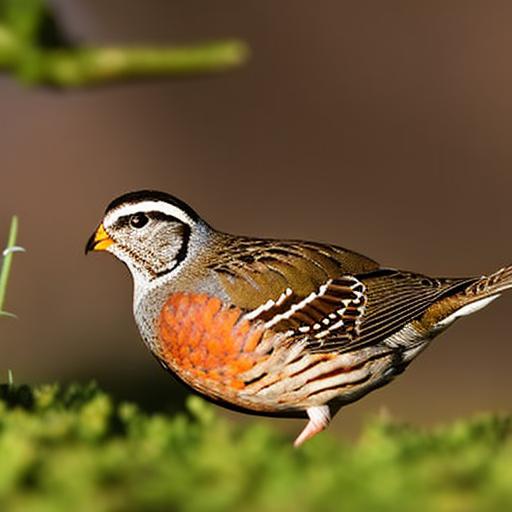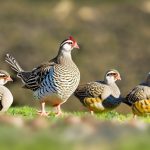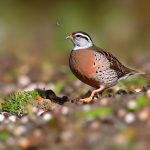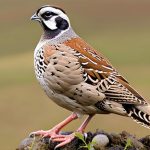When it comes to choosing the right quail breed for your needs, there are several factors to consider. First, you’ll want to think about the purpose of raising quail. If you’re looking to raise quail for their eggs, you may want to consider breeds such as Coturnix quail, which are known for their prolific egg-laying abilities. If you’re interested in raising quail for meat, breeds like the Jumbo Coturnix or the Bobwhite quail may be more suitable due to their larger size.
Another important factor to consider when choosing a quail breed is the climate in which you live. Some quail breeds are better suited to colder climates, while others thrive in warmer environments. For example, the Bobwhite quail is well adapted to the hot, humid conditions of the southern United States, while the Coturnix quail is more tolerant of colder temperatures.
Finally, consider the space you have available for raising quail. Some breeds, like the Coturnix quail, are known for their ability to thrive in smaller enclosures, making them a good choice for those with limited space. On the other hand, breeds like the Bobwhite quail may require more room to roam and forage. By taking these factors into consideration, you can choose the right quail breed that best suits your needs and environment.
Key Takeaways
- Consider the purpose of raising quail (meat, eggs, pets) when choosing the right breed
- Provide at least 1 square foot of space per quail in the housing and enclosure
- Feed quail a balanced diet of commercial quail feed, greens, and occasional treats
- Monitor quail for signs of common diseases such as coccidiosis and respiratory infections
- Use an incubator or broody hen for hatching quail eggs, and provide a warm and safe environment for chicks
Housing and Enclosure for Quail
When it comes to housing and enclosure for quail, there are a few key considerations to keep in mind. First and foremost, it’s important to provide enough space for your quail to move around and exhibit natural behaviors. A general rule of thumb is to provide at least 1 square foot of space per quail, though more space is always better if possible.
In addition to space considerations, it’s important to provide a safe and secure enclosure for your quail. This means ensuring that the enclosure is predator-proof, with sturdy walls and a secure roof to protect your birds from potential threats. Additionally, it’s important to provide adequate ventilation to prevent the buildup of ammonia and other harmful gases.
Another important aspect of quail housing is providing appropriate bedding material. Good options for bedding include straw, pine shavings, or sand, which can help absorb moisture and provide a comfortable surface for your quail to walk on. Finally, it’s important to provide access to fresh water and appropriate feeders for your quail within their enclosure. By taking these factors into consideration, you can create a safe and comfortable living environment for your quail.
Feeding and Nutrition for Quail
Feeding and nutrition are crucial aspects of raising healthy quail. When it comes to feeding quail, it’s important to provide a balanced diet that meets their nutritional needs. A good quality commercial game bird feed is a good starting point, as it is formulated to provide the essential nutrients that quail require. Additionally, offering access to grit or small stones can help aid in the digestion of food in quail.
In addition to commercial feed, it’s important to supplement your quail’s diet with fresh greens and protein sources. This can include offerings such as leafy greens, mealworms, or small amounts of fruits and vegetables. It’s important to monitor your quail’s intake and adjust their diet as needed based on their activity level and overall health.
Another important aspect of feeding and nutrition for quail is providing access to clean, fresh water at all times. Quail can be particularly sensitive to dehydration, so it’s crucial to ensure that they have access to water throughout the day. Additionally, it’s important to regularly clean and sanitize water and feed containers to prevent the buildup of harmful bacteria.
By providing a balanced diet that meets their nutritional needs and ensuring access to clean water, you can help ensure that your quail remain healthy and thrive in your care.
Health and Disease Management for Quail
Maintaining the health of your quail is essential for their overall well-being. One of the most important aspects of health and disease management for quail is regular observation and monitoring of your birds. This includes keeping an eye out for any signs of illness or injury, as well as monitoring their overall behavior and activity levels.
In addition to regular observation, it’s important to provide a clean living environment for your quail. This includes regularly cleaning their enclosure and providing fresh bedding material. Additionally, it’s important to regularly clean and sanitize water and feed containers to prevent the buildup of harmful bacteria.
Another important aspect of health management for quail is providing access to appropriate veterinary care when needed. This includes finding a veterinarian who is knowledgeable about quail care and can provide guidance on preventative measures as well as treatment options if your birds become ill.
Finally, it’s important to be proactive about disease prevention by practicing good biosecurity measures. This includes limiting exposure to wild birds and other potential sources of disease, as well as quarantining new birds before introducing them to an existing flock. By taking these steps, you can help ensure that your quail remain healthy and disease-free.
Breeding and Incubation of Quail Eggs
Breeding and incubation of quail eggs can be a rewarding aspect of raising quail. When it comes to breeding quail, it’s important to provide a suitable environment that encourages natural mating behaviors. This includes providing enough space for your birds to move around and exhibit natural behaviors, as well as ensuring that they have access to appropriate nesting areas.
Once your quail have successfully mated and laid eggs, it’s important to carefully collect and handle the eggs for incubation. This includes collecting eggs daily and storing them in a cool, dry environment until you are ready to begin the incubation process.
When it comes to incubating quail eggs, it’s important to provide a stable and controlled environment that mimics the conditions of a brooding hen. This includes maintaining a consistent temperature and humidity level throughout the incubation period, as well as regularly turning the eggs to ensure proper development.
Once the eggs have hatched, it’s important to provide a warm and safe environment for the newly hatched chicks. This includes providing access to appropriate feed and water, as well as ensuring that they have access to a clean and comfortable living space.
By providing a suitable breeding environment and carefully managing the incubation process, you can help ensure successful hatching and healthy development of your quail chicks.
Quail Behavior and Socialization
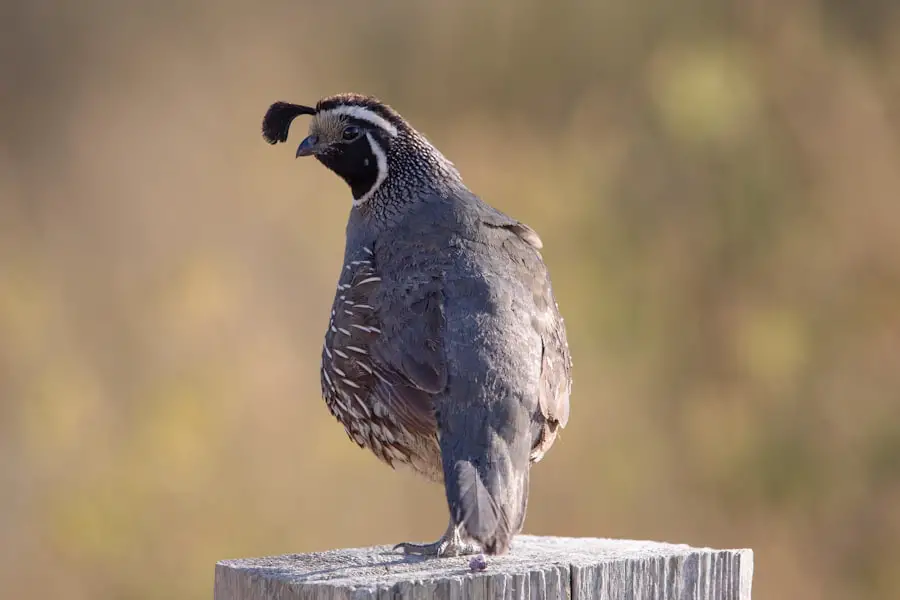
Understanding quail behavior and socialization is essential for providing a suitable living environment for your birds. Quail are social animals that thrive in groups, so it’s important to provide enough space for them to move around and interact with one another. Additionally, providing appropriate hiding spots and nesting areas can help reduce stress and encourage natural behaviors in your birds.
Quail are also known for their active and curious nature, so it’s important to provide enrichment activities that encourage natural behaviors such as foraging and dust bathing. This can include offering access to natural materials like straw or sand, as well as providing opportunities for your birds to explore their environment.
When introducing new birds into an existing flock, it’s important to do so gradually and carefully monitor their interactions. This can help reduce the risk of aggression or bullying within the group. Additionally, providing enough space and resources for all birds can help reduce competition and promote harmonious social interactions.
By understanding quail behavior and socialization, you can create a living environment that meets their social needs and encourages natural behaviors.
Tips for Raising Quail as Pets
Raising quail as pets can be a rewarding experience that offers unique opportunities for observation and interaction with these fascinating birds. When raising quail as pets, it’s important to provide a suitable living environment that meets their physical and social needs. This includes providing enough space for them to move around and exhibit natural behaviors, as well as offering opportunities for social interaction within a group.
Additionally, providing enrichment activities such as hiding spots, nesting areas, and opportunities for foraging can help keep your pet quail engaged and stimulated. This can include offering access to natural materials like straw or sand, as well as providing opportunities for your birds to explore their environment.
It’s also important to provide access to appropriate veterinary care when needed. This includes finding a veterinarian who is knowledgeable about quail care and can provide guidance on preventative measures as well as treatment options if your birds become ill.
Finally, it’s important to spend time observing and interacting with your pet quail on a regular basis. This can help strengthen the bond between you and your birds while also allowing you to monitor their health and behavior closely.
By providing a suitable living environment, enrichment activities, access to veterinary care, and regular interaction with your pet quail, you can help ensure that they remain healthy and happy in your care.
If you’re looking to keep quail, you may also be interested in learning about the care and breeding of geese. Understanding how many eggs geese lay and how to care for goslings can provide valuable insights for poultry enthusiasts. For more information on this topic, check out this informative article on how many eggs geese lay. It’s a great resource for those interested in expanding their knowledge of poultry breeding and care.
FAQs
What are quail?
Quail are small, ground-dwelling birds that belong to the family Phasianidae. They are known for their distinctive calls and are often hunted for sport and food.
What are the benefits of keeping quail?
Keeping quail can provide a sustainable source of eggs and meat. Quail eggs are considered a delicacy and are known for their nutritional value. Additionally, quail are relatively low-maintenance and can be kept in smaller spaces compared to other poultry.
What do quail need to thrive?
Quail require a secure and spacious enclosure with access to fresh water, a balanced diet, and protection from predators. They also need a suitable nesting area and proper ventilation in their living space.
What do quail eat?
Quail are omnivorous and eat a diet that consists of seeds, grains, insects, and small invertebrates. It is important to provide them with a balanced commercial feed or a mix of grains and protein sources.
How do you care for quail chicks?
Quail chicks require a warm and draft-free brooder with access to food and water. They need a balanced diet and protection from predators. It is important to monitor their health and provide proper care to ensure their well-being.
Meet Walter, the feathered-friend fanatic of Florida! Nestled in the sunshine state, Walter struts through life with his feathered companions, clucking his way to happiness. With a coop that’s fancier than a five-star hotel, he’s the Don Juan of the chicken world. When he’s not teaching his hens to do the cha-cha, you’ll find him in a heated debate with his prized rooster, Sir Clucks-a-Lot. Walter’s poultry passion is no yolk; he’s the sunny-side-up guy you never knew you needed in your flock of friends!

